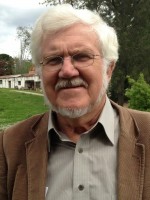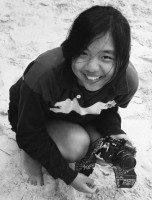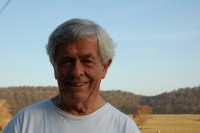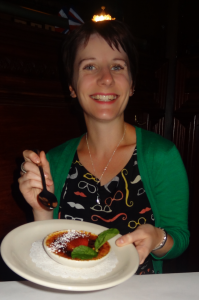 Geoff Page is based in Canberra and has published twenty-one collections of poetry as well as two novels and five verse novels. He’s also won the Grace Leven Prize and the Patrick White Literary Award, among others. His recent books include A Sudden Sentence in the Air: Jazz Poems (Extempore 2011), Coda for Shirley (Interactive Press 2011), Cloudy Nouns (Picaro Press 2012), 1953 (University of Queensland Press 2013), Improving the News (Pitt Street Poetry 2013) and New Selected Poems (Puncher & Wattmann 2013). His Aficionado: A Jazz Memoir is forthcoming from Picaro Press.
Geoff Page is based in Canberra and has published twenty-one collections of poetry as well as two novels and five verse novels. He’s also won the Grace Leven Prize and the Patrick White Literary Award, among others. His recent books include A Sudden Sentence in the Air: Jazz Poems (Extempore 2011), Coda for Shirley (Interactive Press 2011), Cloudy Nouns (Picaro Press 2012), 1953 (University of Queensland Press 2013), Improving the News (Pitt Street Poetry 2013) and New Selected Poems (Puncher & Wattmann 2013). His Aficionado: A Jazz Memoir is forthcoming from Picaro Press.
The Dolphins
In the night and in the early morning he contemplates the turning
earth — its slice of light, its slice of dark, the strips of dawn and dusk
between. He thinks about the replications. How many others rest like
him for ten spent minutes afterwards? She feels his weight; it’s not
oppressive. There have been others, just a few, allowing some
comparison. How many other women now, she thinks, lie spread
-eagled just like her, exhausted but not satisfied? A new light clarifies
the blind. She takes herself back fifteen minutes; rippled waves of
pleasure, currents lapping at a shore but not quite breaking. Her
feelings, plainly, are unique — and yet she knows it can’t be so. All
up and down that width of light (or light before the light) thousands,
even millions maybe, have had the same euphoria. They share a
longitude. A gratitude as well perhaps — and somewhere, too, a hint
of pain. Returning to flaccidity, he’s thinking now how many men —
their sheets, like these, in disarray — lie between a woman’s legs,
bisecting the same triangle, their minds regaining focus. She, too, is
starting on her day: its obligations flicker — diverging from,
converging with, the thoughts of him whose weight she bears. How
many others now, she thinks, are moving in small increments from
relish to discomfort? How well really does she know him, this man
who any minute now will make his slow withdrawal; turn her gently
on her side; then snuggle in behind. She knows that, maybe in at
work, there’ll be a wash of fantasy; some untried complication of the
limbs, an urgency not felt so far — and knows that even this will not
be hers alone. Elaborations of that kind, she knows, are far from
infinite. It may or may not need this man, his nakedness curved in
behind her, a hand shaped to her further breast. He sees the thoughts
that scatter in her mind as now her breath turns regular and deepens
into sleep — in search of, or resistant to, the morning in her mobile.
Its ring tone will be one of hundreds, available at purchase. But he’s
awake and thinking back to what they’d managed, the clever element
of drama, its narrative momentum, a story that they tell each other,
hardly needing words, a story that is theirs alone — habits, tricks and
sweet agreements arrived at over years — secrets not for counsellors
(and many more, they know, would share the same restraint). The
light continues through the blind. He knows he won’t get back to
sleep and knows by now that she’ll be dreaming. He likes to think
that he can read them. What is it she is seeing now? Porpoises
perhaps? Or dolphins, riding in towards the shore, plunging there in
unison; then turning back as one before they hit the sand? They have
a smoothness he remembers; a rhythm that’s familiar. He knows their
brains might seem to science almost identical. And yet he knows
each one must be a single dot of consciousness which, right down
through the history of the sea, has never been repeated.
 Shirley Lu is a poet from Sydney, New South Wales. Her work has appeared in Freckled Magazine, Thistle Magazine, A Hundred Gourds, and elsewhere. She is interested in and inspired by the origins of words, the gap between a source and its translation(s), and sunlight.
Shirley Lu is a poet from Sydney, New South Wales. Her work has appeared in Freckled Magazine, Thistle Magazine, A Hundred Gourds, and elsewhere. She is interested in and inspired by the origins of words, the gap between a source and its translation(s), and sunlight.






